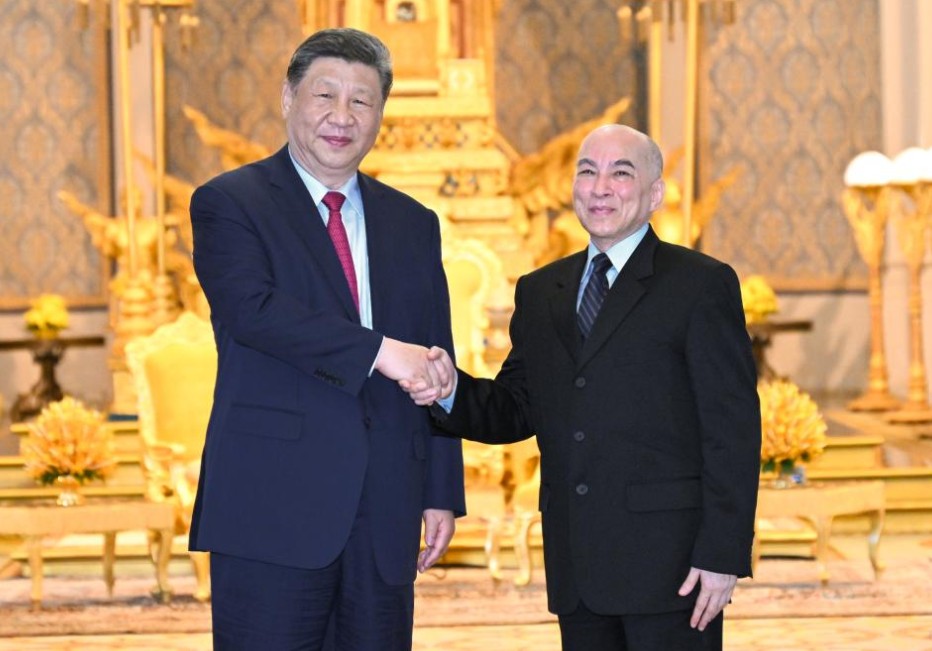PHNOM PENH – Chinese President Xi Jinping wrapped up a high-profile diplomatic tour of Southeast Asia on Thursday with a two-day state visit to Cambodia, marking the final leg of a regional charm offensive aimed at reinforcing Beijing’s influence amid escalating trade tensions with the United States.
Welcomed at Phnom Penh International Airport by King Norodom Sihamoni and Prime Minister Hun Manet, Xi’s arrival underscores the strategic importance of Cambodia in China’s regional vision. “Cambodia is a priority in China’s neighborhood diplomacy,” Xi declared, affirming Beijing’s commitment to supporting the country’s “strategic autonomy” and “development path suited to its national conditions.”
This is Xi’s first visit to Cambodia since Hun Manet succeeded his father, Hun Sen, as Prime Minister in 2023. Xi also met with Senate President Hun Sen, now positioned as a key political elder and close ally of Beijing.
Xi Counters U.S. Pressure with Economic Reassurance
The visit comes at a pivotal moment for Cambodia, which is facing some of the steepest U.S. tariffs in the region. In addition to a blanket 10% tariff imposed under President Donald Trump’s sweeping trade measures, Cambodian exports are expected to be hit with an additional 49% penalty following a 90-day exemption period set to expire in June. The looming sanctions have sparked concern among Cambodian manufacturers and exporters heavily reliant on U.S. markets.
Xi capitalized on this uncertainty, presenting China as a steadfast economic partner and defender of a “fair and open” global trade order. In an editorial published in major Cambodian newspapers, Xi called on regional countries to “resist protectionism” and “jointly safeguard the multilateral trading system,” despite China’s own protectionist measures at home.
37 Bilateral Agreements Signed
In Phnom Penh, China and Cambodia signed 37 agreements covering a wide range of sectors including:
- Trade & Investment: Expanded preferential trade access for Cambodian agricultural goods and Chinese investment pledges in light manufacturing and special economic zones.
- Infrastructure: New commitments under the Belt and Road Initiative (BRI), including the expansion of the Phnom Penh-Sihanoukville Expressway and upgrades to Cambodia’s railway network.
- Healthcare Cooperation: Joint disease surveillance and training programs, with China pledging medical technology and pandemic preparedness support.
- Tourism Revival Plan: Visa-free travel for Chinese citizens and increased charter flights to boost post-COVID tourism.
- Agricultural Development: Collaboration on irrigation systems and advanced rice cultivation techniques.
Strengthening Ties Amid Global Realignment
Analysts view Xi’s regional tour — which included Vietnam, Malaysia, and Cambodia — as a calculated move to consolidate China’s position in Southeast Asia at a time of growing geopolitical fragmentation and economic decoupling from the U.S.
“China is sending a clear message to Washington: we are not isolated, and our neighborhood is with us,” said Dr. Sophea Chan, an international relations scholar at the Royal University of Phnom Penh. “Cambodia’s deepening reliance on China is part of a broader regional trend.”
In contrast to the uncertainty surrounding U.S. foreign policy, Xi’s message throughout the trip emphasized long-term commitment, infrastructure financing, and trade interdependence — themes that resonate in countries seeking stability amid global volatility.
As Xi Jinping departed Phnom Penh, both Chinese and Cambodian officials hailed the visit as a milestone in their “ironclad friendship” — one likely to further cement Cambodia’s position as one of China’s closest allies in Southeast Asia, and a key node in Beijing’s economic and diplomatic network. (zai)

